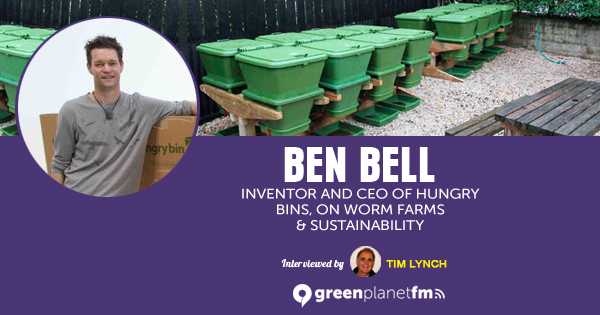
Even in his day he was aware that many cultures in the 19th century were very conscious of the role that earthworms played in the creation of high quality soil and fertility.
When we understand the complexity and the relationships within the web of life and when we take the time to understand the grandeur in a fork full of compost, we realise that trillions of microflora, spiralling DNA, decaying leaf matter plus minerals and life force can be enabled to journey up through a young tree, to eventually manifest a juicy fresh golden peach in our hands - as undeniable ripe-full fruition.
From dark dirt of the earth to fleshy, succulence and juicy sweetness - the transmutation of minerals into food, nobly assisted by the humble earth worm.
Ben started off young, with grandparents having incredible gardens and his grandmother having bees so they were constantly embedding themselves in high quality food and the enthusiasm of growing food for themselves and that his parents were also into sustainability. So his upbringing was very focused on growing food by organic means in which he terms his kaupapa - respect for growing food and eating it being always present.
Then when living in Auckland decided on worm farming so as to build up his soil at the back of his flat in Grey Lynn, he was given a plant called Epiphyllum oxypetalum. The flower of this night-blooming cereus opens once a year after sunset for one night and ONE NIGHT ONLY. It responded incredibly well to worm juice.
At the time he was working in television making commercials, Ben realised that there were far larger issues in life that were global in intent and he decided to shift towards a positive contribution to the environment. In particular he noticed that we as a society need to look far more closely at how media encourages us use more resources, yet without the mindfulness as to where they have come from.
He found that working in an industry that has a positive environmental benefit was far more fulfilling than working in an industry that was creating so many ecological issues.
Hence the re working of the old plastic worm farms out of old discarded plastic bins in his back yard, led him to the knowing that our food waste could be turned around and put to good use.
That earthworms have the near instantaneous capacity to breakdown nutrients, like decaying leaf matter so that it can be quickly taken up by a plant in a very potent form.
In this interview, Ben explains the potency that is 'packaged' in a corn kernel and tells us about the power and the potency that lies within the kernel of any seed as a future plant. When we look at a cone seed of a kauri or an acorn of an oak tree, to realise the concentration of energy within such a small container, carries the life fore to be the possible gigantic tree of the future. The fact that there are huge numbers of seeds put out by one tree or plant too speaks to the fecundity of nature.
Also, how our farming, with fertilizers, food processing and even eating of food has changed massively since the 2nd World War and that this continues to this day and that it is inherently unstable.
In NZ 50% of our waste stream in an industrial city is food waste which is also an incredible resource. For example for every calorie of food we ingest there is up 10 calories of fossil fuel embedded in it already.
Water too has become a premium, for example, in California, where today there is a disastrous and devastating drought, every almond has a gallon of water embedded in it. This is the cost that has to be taken into account when irrigating almond plantations on an industrial scale, in an area, where almonds were not the natural tree of the environment. This translates in motor vehicle parlance to 1 gallon of water per one solitary almond.
Our world has a million stories of hidden environmental costs - across the whole spectrum of heavy industrial farming, for example, where they have animal feed lots of 40,000 cattle in one intense containment area. These have huge animal waste issues.
Ben tells us about composting worms and Hungry Bin. Hungry bin has a strong and tangible environmental outcome that hooks people up into the natural process of growing food, and cultivating plants and even the idea of at least taking care of our own waste and that it can be processed on site in an environmentally benign way. And, if it is to be transported somewhere it is in its most concentrated and most useful form. Some people have their own pet trees in parks or friends places and take their worm juice and put it around trees they like to nourish and nurture.
Listen to the fascinating story that; after the earth worm has produced a vermicast and whole legion of bacteria, moulds and fungi continue that breakdown process further. And going all the way back to hunter gathers, they all had an understanding that good soil had worms in it. It being an innate thing,that we can recognise what good soil is.
So what is it that divorced ourselves from the connection to the soil,the land and to nature? For example many of the food products we purchase, we are so distant from the source such as globalised food coming from around our planet, much of it packaged and sanitised in so many ways.
When we look back at indigenous societies, they have always had an intimate and exceptionally close connection to their environment. Such as the Aotearoan Maori here in NZ, they always acknowledged their local mountain, lake or river and that when the first nation peoples of North America first encountered the invading white man, they instinctively knew that these palefaces were going to cause environmental devastation. As they themselves had a very deep spiritual connection to their great sustainer, they inherently understood that it was the earth mother that was going to be de-sacralised.
For us today, it is important that we start to take responsibility for the impact that we are making upon the earth because we have a tendency to marginalise the environmental costs that are impacting the ecological systems, both locally and globally.
By starting off with your own composting system, we start to get an understanding and an eventual affinity with the complexity and shear beauty of natural systems, tightly coupled ...
Children growing food, making a little garden planting seeds, watching them break through the surface of the soil, and the unrestrained joy of a little one eating of a hand full on fresh green peas ...
Hungry bins now have 70 bins in the Auckland City Council building basement and Auckland's Mt Eden Prison has 200 of them, giving prisoners an understanding of natures process whilst making substantial savings too.
Note that in the new world there were basically very few compost worms, and that they had to be brought from Europe to start doing there work composting in Australia, NZ and America.
There is a difference between compost and earth worms. Compost worms are carnivorous and can not live in your garden, only in the compost heap, unless you have heaps of moisture, organic material and mulch covering the soil. Earthworms are different, they live deeper and eat the soil to digest the organic material.
Each Hungry bin when fully functional has between 2 and 4 kilos of worms in side each unit.
This is a rough synopsis of the first 20 minutes of this interview ...
Other subjects covered:
Auckland city and composting organic waste.
In some streets in Auckland up to 50% of the houses are already composting.
Council needs to involve itself more in communicating with and listening to the people to find community based solutions, this way we enable a community to have the deep levels of commitment and to become more resilient.
Covering champions of the environment Sir Peter Blake, the Maui Dolphin challenge.
Economically environmentally sustainable solutions - how to stay viable as a commercial business and with your values intact.
Consumer products and goods, supply chains ... media and advertising instantaneous information, accessing and utilisation. How we can use information to benefit society.
Change is possible not only within our peer group, but the entire planet is now at our finger tips ... and the speed of information and how we can move this, to shift awareness is going to be pivotal.
Developing a sense of moral outrage of how we are pulling the rung out from beneath our children's feet.
All species are iconic all ecosystems are crucial to the way we live.
This is a very intelligent and coherent interview of the challenges facing us as a species and well worth the time to listen.
